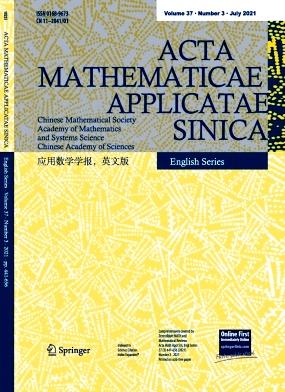Global Zero-relaxation Limit Problem of the Electro-diffusion Model Arising in Electro-Hydrodynamics
IF 0.9
4区 数学
Q3 MATHEMATICS, APPLIED
Acta Mathematicae Applicatae Sinica, English Series
Pub Date : 2024-01-03
DOI:10.1007/s10255-024-1119-2
引用次数: 0
Abstract
In this paper, we study a global zero-relaxation limit problem of the electro-diffusion model arising in electro-hydrodynamics which is the coupled Planck-Nernst-Poisson and Navier-Stokes equations. That is, the paper deals with a singular limit problem of
$$\left\{ \begin{gathered}
\begin{array}{*{20}{c}}
{u_t^\varepsilon+ {u^\varepsilon } \cdot \nabla {u^\varepsilon } - \Delta {u^\varepsilon } + \nabla {P^\varepsilon } = \Delta {\phi ^\varepsilon }\nabla {\phi ^\varepsilon },}&{in{\text{ }}{\mathbb{R}^3} \times (0,\infty )} \\
{\nabla\cdot {u^\varepsilon } = 0,}&{in{\text{ }}{\mathbb{R}^3} \times (0,\infty )}
\end{array} \hfill \\begin{array}{*{20}{c}}
{n_t^\varepsilon+ {u^\varepsilon } \cdot \nabla {n^\varepsilon } - \Delta {n^\varepsilon } =- \nabla\cdot ({n^\varepsilon }\nabla {\phi ^\varepsilon }),}&{in{\text{ }}{\mathbb{R}^3} \times (0,\infty )} \\
{c_t^\varepsilon+ {u^\varepsilon } \cdot \nabla {c^\varepsilon } - \Delta {c^\varepsilon } = \nabla\cdot ({c^\varepsilon }\nabla {\phi ^\varepsilon }),}&{in{\text{ }}{\mathbb{R}^3} \times (0,\infty )}
\end{array} \hfill \\begin{array}{*{20}{c}}
{{\varepsilon ^{ - 1}}\phi _t^\varepsilon= \Delta {\phi ^\varepsilon } - {n^\varepsilon } + {c^\varepsilon },}&{in{\text{ }}{\mathbb{R}^3} \times (0,\infty )} \\
{({u^\varepsilon },{n^\varepsilon },{c^\varepsilon },{\phi ^\varepsilon })\left| {_{t = 0 = ({u_0},{n_0},{c_0},{\phi _0})},} \right.}&{in{\text{ }}{\mathbb{R}^3}}
\end{array} \hfill \\
\end{gathered}\right.$$
involving with a positive, large parameter ϵ. The present work show a case that (uϵ, nϵ, cϵ) stabilizes to (u∞, n∞, c∞):= (u, n, c) uniformly with respect to the time variable as ϵ → + ∞ with respect to the strong topology in a certain Fourier-Herz space.
电流体力学中出现的电扩散模型的全局零松弛极限问题
本文研究了电流体力学中产生的电扩散模型的全局零松弛极限问题,该模型是普朗克-恩斯特-泊松方程和纳维-斯托克斯方程的耦合。也就是说,本文讨论的是一个奇异极限问题:$$\left\{ \begin{gathered}\begin{array}{*{20}{c}}{u_t^\varepsilon+ {u^\varepsilon }。\cdot \nabla {u^\varepsilon }- \Delta {u^\varepsilon }+ \nabla {P^\varepsilon }= \Delta {\phi ^\varepsilon }\nabla {phi ^\varepsilon },}&{in{text{ }}\{mathbb{R}^3}\times (0,/infty )} ({u^\varepsilon } = 0,}&{u^\varepsilon}}。= 0,}&{in{text{ }}{mathbb{R}^3}\times (0,/infty )} (end{array})\hfill\begin{array}{*{20}{c}}{n_t^\varepsilon+ {u^\varepsilon }\nabla {n^\varepsilon }- \Delta {n^\varepsilon }=- ({n^\varepsilon }\nabla {\phi ^\varepsilon }),}&{in(text{ }}{mathbb{R}^3}}.\{c_t^\varepsilon+ {u^\varepsilon }\(cdot ) (nabla {c^\varepsilon }- \Delta {c^\varepsilon }= ({c^\varepsilon }\nabla {\phi ^\varepsilon }),}&{in{text{ }}{mathbb{R}^3}}.\times (0,/infty )} (end{array})\hfill (begin{array}{*{20}{c}}{{\varepsilon ^{ -1}}\phi _t^\varepsilon= \Delta {\phi ^\varepsilon }- {n^\varepsilon }+ {c^\varepsilon },}&{in {\text{ }}{mathbb{R}^3}\times (0,\infty )} ({({u^\varepsilon },{n^\varepsilon },{c^\varepsilon },{\phi ^\varepsilon })\left| {_{t = 0 = ({u_0},{n_0},{c_0},{\phi _0})},} \right.}&{in{\text{ }}{mathbb{R}^3}}.\end{array}\$ 涉及一个正的、大的参数ϵ。本研究展示了一种情况,即(uϵ, nϵ, cϵ)稳定为(u∞, n∞, c∞):= (u, n, c),时间变量均匀为ϵ → + ∞,与某一傅里叶-赫兹空间中的强拓扑有关。
本文章由计算机程序翻译,如有差异,请以英文原文为准。
求助全文
约1分钟内获得全文
求助全文
来源期刊
CiteScore
1.30
自引率
0.00%
发文量
70
审稿时长
3.0 months
期刊介绍:
Acta Mathematicae Applicatae Sinica (English Series) is a quarterly journal established by the Chinese Mathematical Society. The journal publishes high quality research papers from all branches of applied mathematics, and particularly welcomes those from partial differential equations, computational mathematics, applied probability, mathematical finance, statistics, dynamical systems, optimization and management science.

 求助内容:
求助内容: 应助结果提醒方式:
应助结果提醒方式:


